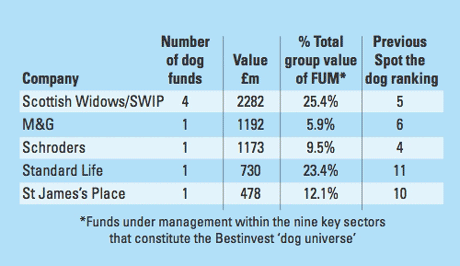It’s time to ditch your dog funds
If you own shares in any of the underperforming funds on this list of shame, ditch them. Tim Bennett explains what you should buy instead.
Get the latest financial news, insights and expert analysis from our award-winning MoneyWeek team, to help you understand what really matters when it comes to your finances.
You are now subscribed
Your newsletter sign-up was successful
Want to add more newsletters?

Twice daily
MoneyWeek
Get the latest financial news, insights and expert analysis from our award-winning MoneyWeek team, to help you understand what really matters when it comes to your finances.

Four times a week
Look After My Bills
Sign up to our free money-saving newsletter, filled with the latest news and expert advice to help you find the best tips and deals for managing your bills. Start saving today!
Quite how some fund managers keep their well-paid jobs is a mystery. Every six months, BestInvest publishes its list of Dog Funds the worst-performing unit trusts and open-ended investment companies (excluding pension funds, with-profit funds, institutional funds, corporate bond and property funds). Every year for the last few, the same names have popped up in the top ten. Who are they and how can you shake them up?
Making the list shouldn't be easy. To qualify as a dog', a fund has to have missed its benchmark in each of the past three years, and also has to have underperformed by 10% or more cumulatively over that period. That's why it's pretty shocking to find that around £9bn of our money is sitting in funds that make the list. The worst funds have actually lost money even as their benchmark rose. To add insult to injury, last year alone £133m was paid in fees to these consistent underperformers.
While the overall number of dog funds' has fallen this year, thanks to a sharp rally in the stockmarket since last summer (not to mention the exclusion of the last six months of 2008 when stockmarkets froze), 108 still make the BestInvest 10% club.
MoneyWeek
Subscribe to MoneyWeek today and get your first six magazine issues absolutely FREE

Sign up to Money Morning
Don't miss the latest investment and personal finances news, market analysis, plus money-saving tips with our free twice-daily newsletter
Don't miss the latest investment and personal finances news, market analysis, plus money-saving tips with our free twice-daily newsletter
Top of the list this time around is Scottish Widows, owned by part-state-owned Lloyds Banking Group. They are the proud handlers of £2.2bn of your hard-earned cash and can boast four consistent underperforming funds. That's enough to move Scottish Widows from position five last time into the gold-medal spot this time.

Joining them on the podium are M&G and Schroders (although, to be fair to these two, this is down to poor performance by just one fund in each case). For a full copy of the report, see Bestinvest.co.uk.
There's no excuse for any of these dogs. Not one underperformer has offered to refund fees or cut their annual management charge. The defence that investors should take a long-term view doesn't wash as BestInvest's Adrian Lowcock puts it: "how long should investors wait for the performance to come back?" Some of these funds are even underperforming the much-derided with-profits funds that have (rightly) attracted so much flak.
So what should you do if you own one of these funds? Simple. Ditch it. You can buy a cheap tracker, and many people are UK investor interest in these, at 6.8% of all fund assets, is now at record levels, says Elaine Moore in the Financial Times. Another good option is to switch into an equivalent investment trust where charges tend to be lower. Among others, we like the Personal Assets Trust (LSE: PNL).
Get the latest financial news, insights and expert analysis from our award-winning MoneyWeek team, to help you understand what really matters when it comes to your finances.
Tim graduated with a history degree from Cambridge University in 1989 and, after a year of travelling, joined the financial services firm Ernst and Young in 1990, qualifying as a chartered accountant in 1994.
He then moved into financial markets training, designing and running a variety of courses at graduate level and beyond for a range of organisations including the Securities and Investment Institute and UBS. He joined MoneyWeek in 2007.
-
 Pitch to Portfolio: Lioness Jill Scott's investing game plan
Pitch to Portfolio: Lioness Jill Scott's investing game planPodcast After bringing football home as a Lioness, Jill Scott discusses how she transformed her finances and became an investor in this latest episode of MoneyWeek Talks.
-
 UK unemployment hits highest level since 2021 – will interest rate cuts follow?
UK unemployment hits highest level since 2021 – will interest rate cuts follow?UK unemployment reached its highest rate in almost five years by the end of 2025. Is AI to blame and will the Bank of England step in with an interest rate cut in March?